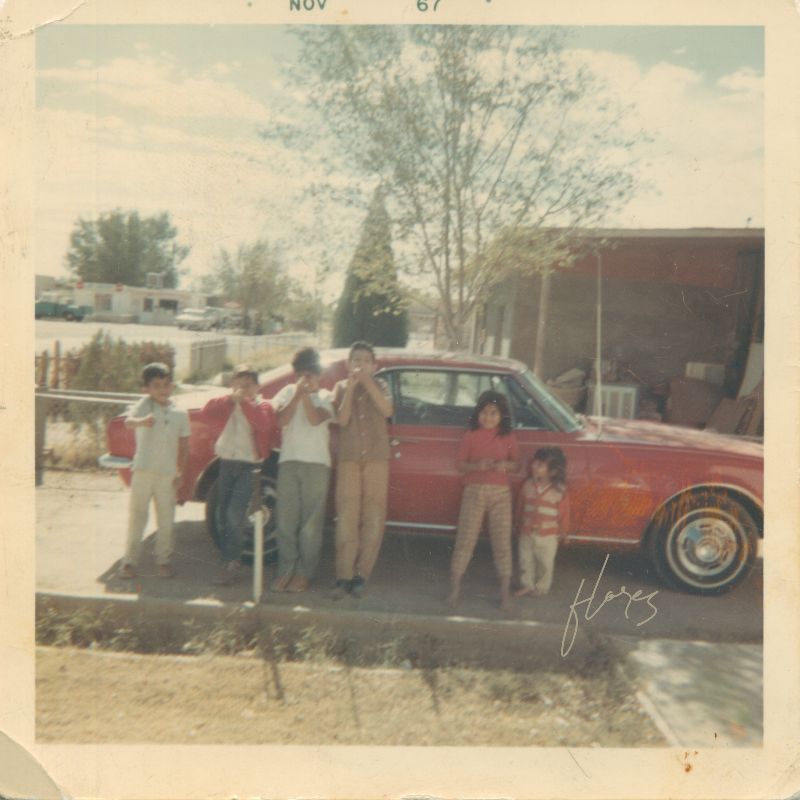After taking her second U.S. stage at SXSW this year, El Paso native Flores spoke with Austin Woman about music, message and her future.

By Cy White
There are some stories that sit in you. Make a home in your chest and move you to act and see and do in ways you’ve never moved, acted or seen before. Music has a resounding effect on how many people live their lives. The stories captured between notes often open the listener’s eyes to the what’s around them. In this way, San Antonio native Flores builds her musical landscapes.
Hers is a story of water. The essence of life that nourishes, grows and heals. She creates music meant to truly engage the soul and mind. Her career up to this point has been steady. A progressive climb ever upward to this very moment, the release of The Lives They Left.
When everyone wants so desperately to put everything into a category they can easily identify, it’s not that simple for Flores. Yes, R&B and soul are the driving forces behind her music. But digging deeper into the true spirit of her sound means dissecting the emotions behind it.
“It depends on the song,” she says. “We try to create based on the song rather than always trying to find everything that sounds as cohesive as possible, just to kind of have a different vibe. Afterwards, when we’re done making the EP and picking songs, because we had so many to choose from, we were like, ‘Now we know what our message is. This is what we want to say.’ For American Dirt, we wanted a specific sound, but there was also some type of sampling used to generate this. Then we got strings on it. We go in with an idea like, Solange, obviously a huge inspiration. But you also know I’m never gonna write ‘Cranes in the Sky,’ you know.”
Art Through Pain
Much like Solange, Flores writes about hard, true things. Moments in life where growth was a painful, albeit necessary, experience. When she writes things like, “Did you love me once? Throw my body down the river. I’ll say a prayer for you (“Wings”),” you know it’s coming from a place of deep hurt.
“Yes, that song particularly actually has a special meaning,” she says, a rueful smile spreading across her face. “I had two separate songs that we blended together. It was through a tough period. I was in a long-term relationship, and I was cheated on. Then my dad died at the same time. So I was going through a breakup and a loss. I was just like, ‘I have to find something greater than myself to let this go.’ I think we had [the song]for four or five years. [It was a] song that we’d sat on, and then it just poured out. It’s more gospel, you know? I love gospel music as well. [I found] a little freedom in the idea of just letting it leave me.”
Much of her ability to process her pain comes from the artists who’ve inspired her. Songs like “Fools Gold” wearing the mark of Ms. Lauryn Hill’s “Ex Factor.” Shades of blue, distorted and confused emotions. “I mean, ‘Ex Factor’ is probably one of the best R&B songs of all time,” she says emphatically. “It’s timeless. I will break down every time. It’s that emotive, almost like agony. The chord structure, it’s lamenting, like a whole teardrop.”

Though most artists create some of their greatest art from their greatest pain, no artist is only their heartache. So who is Flores? What makes up the elements of this complex artist, and what are her motivations?
All of Our Rhythm, None of Our Blues
A quick search on the artist will reveal the basics. The daughter of an activist mother, she grew up on a Tigua Indian reservation in the Chiuahuan desert of El Paso, Texas. Just like one of her greatest influences, Tupac Shakur, Flores grew up around the power and rage of an activist movement. While not a Black Panther, as a member of Las Muertes de Juárez, her mother did lead the Ni Una Mas movement at the border. Fists and voices raised to bring awareness to the senseless femicide happening in Juárez, Mexico.
“I’ve watched so many interviews of him,” she says of Shakur. “He’s being open about disparity, how you just can’t turn your eye to those things. My mom is very much this way as well. We’re Latino, so even the black sheep of the family, we’ll always give them food and shelter. So I kind of feel like we’re a community of people that protect each other in a way.
“I feel like there’s a sense of camaraderie, and our struggles, especially in our communities, are similar, even sometimes in gang-affiliated areas,” she continues, describing the distinct connection between Black and Brown communities. “We’re against each other, [but]it feels like there needs to come a time where our communities are together. Our struggles are very similar, very similar.
“Now, you see that there’s so many Haitian people that are coming across, and there’s a large majority of immigrants that come across the border that are also from African descent, and nobody wants to talk about that. It’s a huge issue. We can’t push these things under the rug like they don’t exist. Our communities are suffering and deeply gentrified. They keep pushing us out. We don’t want to see that, but it’s on Billboard, television. You want the culture, you want it all, but you don’t want to see it in your community.”
American Dirt
Flores comes from a long line of fighters, visionaries. Her fearlessness borne from a family and cultural heritage that has almost demanded that she express herself honestly and without apology. Her American Dirt single was the boldest and most brazen piece of work she’s released to date. While all of her music comes from absolute honesty, the brashness of American Dirt gives the listener pause, forces them to go back to identify and reckon with the harsher realities of this so-called American Dream. Opening track “Desaije” features her mother’s voice, a love note to the woman who’s lived her life fighting to ensure her daughters are protected and free to express themselves openly.
Great Mother Ancestor Nina Simone made it very clear: An artist’s responsibility is to represent the times. To speak on the climate, no matter if the heat threatens to burn and scar you. The sign of our times is marked with restless, almost violent transformation. There’s been a metamorphosis in the culture. A consistent and oftentimes brutal energy that’s forced the world to change whether it wants to or not. (And, let’s be clear, a great deal of it does not.)
But art moves culture, particularly art from Black and Brown artists. It not only reflects the times. It informs how to keep time moving forward. Still, most artists are wary of tackling those issues that make them uncomfortable for fear of losing mainstream favor (and capital). However, there are a few, like Flores, who are more than willing to take up the mantle and responsibility that Simone spoke of so vehemently.
“I mean, Nipsey [Hussle] did it,” she says. “I think that those things are really, really important for us, especially if you’re in popular music. But not everybody wants to upset the powers that be. I’ve heard from other artists who’ve struggled with that, having the freedom to do and say what they want. You’d have to reach a certain level of success before you’re allowed to say these things. People will love you either way. But I also wonder work, who do I want to consume my music? I’ve been very specific about that, who I want the future of my music to relate to. Just, you know, separating the wheat from the chaff.”
Flores: Rebelde
It’s a big part of the reason why for much of her earlier work she refused to show her face on her album covers. “There’s a lot of ideas of like, ‘Oh, you have to have a marketing thing. You have to be cohesive; your image has to be like this. You should be selling yourself, look like this.’ Then social media. It’s like incessant pressure to have to look a certain way, and I think it’s really exhausting. It is really, really exhausting. I’m gonna get old like everybody else. Why can’t I just embrace being a human being and not have to feel the constant pressure of being a woman, and then a woman on social media? Then having to be a marketing package. I don’t know,” she says with a sigh. “Maybe I’m approaching it in the wrong way.”
She’s always had the spirit of “rebelde,” a restless soul going against the grain because society is too restrictive. She followed her heart (which she admits belonged in the clutches of a man) to Norway. She nursed her wounds and healed herself through creating her art. When the pandemic closed international borders, she continued to move forward with her desire to release her music. “We were like, ‘Let’s just see what happens,’ you know.”
That attitude, combined with an unwavering enthusiasm for the truth has produced some incredible work. Music that’s as volatile as it is steeped in a healing tradition. She doesn’t deny that it is a burden to be a brown-skinned woman. The weight of society’s expectation that we’ll fix everything with patience and love. Be a caricature of a human to make society feel comfortable.
“Sometimes I think it’s tiring, to have to feel like you got to be this person to say these things,” she admits. “But you know, if you’re listening to something and you get a history lesson from it, like when I listened to Solange, this album, this song, she has words. ‘Please don’t touch my hair.’ Very personal to your experience in the United States. Something that I may not relate to, but when I listen to that, I can listen from her side of the story, or of this world I’m not a part of, and it’s insightful. I think that we can learn a lot from each other’s experiences through listening to your stories, your music, reading articles and supporting each other and our creative work.”
Flores: A Catalyst for Change
This turns into a conversation about the respectability politics many of us have to play. How even then our existence marks us a target and much of the legislation surrounding our bodies is meant to further weaponize us and put us in seemingly endless danger. However, at the end of the day Flores just wants to make the music that’s important to her. She wants to tell the real story of her people, of herself, of her family.
“My great grandfather was lynched by a Texas Ranger,” she says. “That Texas Ranger has a museum dedicated to him. All these things have been happening. My family that has the loss of my great-grandfather. [It] affected my great-grandmother. That’s a fatherless household. [It’s] insane how fatherless households put a tremendous amount of pressure on a woman when she has four or five kids to support. How that kind of creates intergenerational poverty. And it’s amazing to me how we don’t want to talk about those things. We don’t want to talk about the fact that Mexican Americans are part of the American story. Especially along these border regions.
“The school I went to the, our mascot, we’re called The Conquistadores. We’ve been conditioned, since we’re very little in the city I lived, to honor the conquistadors, but they were murderers, rapists. Why would we have to honor them? And where I live, we have this huge statue. It’s the largest statue of a conquistador in the world. His name is Juan de Oñate, and he committed many massacres. He’s famous for them. He was even kicked out of Spain because of how atrocious he was. But we have to somehow look at him and honor his life, when the the land that we live on, where I grew up is a native reservation. We should be honoring the Pueblo women of the region, the Mesoamerican women.

“I want to be a part of the change of the damnation of our colonization and how that affects us today. You and I are products of that. And I think that we should shout it to the rooftops till somebody listens. And if you can do it popularly with a beat, that’ll work too.”
The Lives They Left
Flores is most certainly moving in that direction, if American Dirt is any indication. Organic, music that’s both nature and nurture. “We definitely try to sit in a space between modern R&B, future R&B and old-school,” she says of her musical identity. “How can you have this in between? It’s so difficult to try to be, but I’ve seen a lot of artists go in between those things. Solange does it, and she has great people to do that with. So I think [my music]will always be produced, but for the next project it’s going to be a little bit more experimental, but still with some R&B aesthetic.”
With her longtime collaborator, Maths Times Joy, Flores plans to continue to push the boundaries of the genre and bring music that both enlightens and excites. With the release of her latest EP, The Lives They Left, fans of the young soul songstress have much to anticipate from this season of her blooming. “We wanted to make sure that the message is the most important [thing],” she says. “Everything has to have a purpose. If it’s not there [for]impact, it doesn’t need to be there.”

